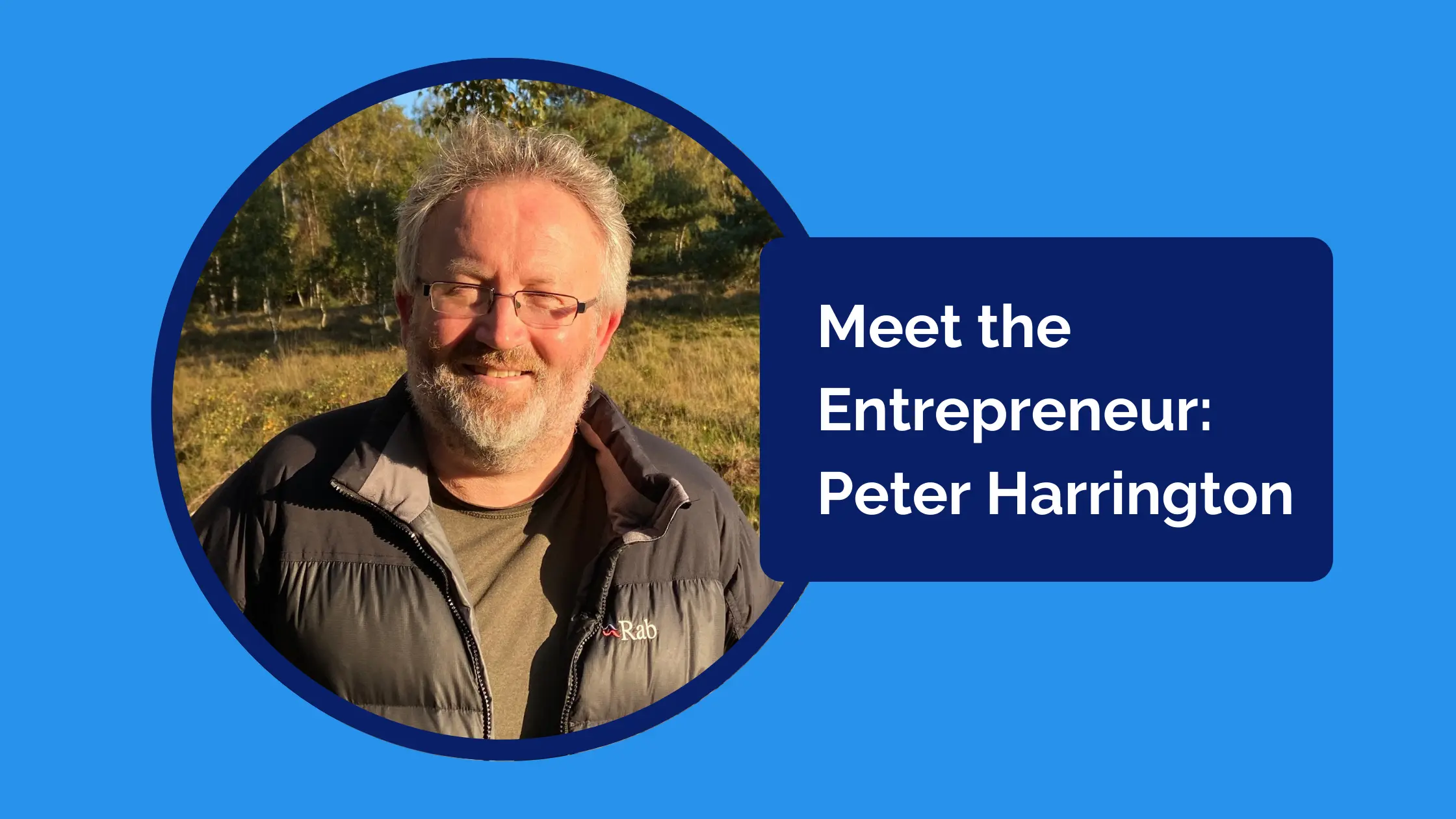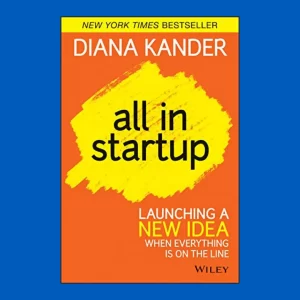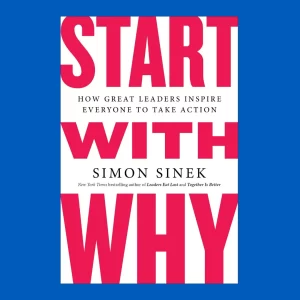Meet the Entrepreneur: Peter Harrington

Serial entrepreneur and SimVenture CEO, Peter Harrington, shares his start-up experience, advice and helpful resources for aspiring entrepreneurs.
Today, I am delighted to be interviewing our very own CEO, Peter Harrington, who has over three decades of experience working as a successful serial entrepreneur.
Since 1989, Peter has started and grown several businesses including Qa Research, Print Revolution, and of course, Venture Simulations Ltd (aka SimVenture).
Whilst none of these ventures have failed, Peter has gained years of valuable learning along the way which he now shares as a: mentor, adviser, guest speaker, podcast host, shareholder, employer and Entrepreneur in Residence at London South Bank University. Entrepreneurs truly are busy people.
In this interview, Peter not only shares his own experience as an entrepreneur, but offers advice, insights and resources to help you make your own start-up a success. We hope you enjoy it, and look forward to seeing what the future holds for you and your venture.
The entrepreneur behind the start-ups
Before we get started, Peter, can you tell us all a little bit about yourself?
Since 1989, I have started and grown businesses in the fields of research, design, marketing, print, consultancy, music production, and educational technology.
My school years were spent in Nottingham but after failing ‘A’ Levels I was unable to go to university. Instead, I discovered travelling, hitchhiking, volunteering, and of course, work. At the age of 19, I did go to the University York St John with the intention of becoming a teacher but ended up leaving with a plan to start my first business, Qa Research.
In that first year of business, I met a woman called Wendy who worked at Barclays Bank. She was brilliant at her job. Seven years later, I met her again as a volunteer as part of support for MENCAP. Within 18 months we were married. Fast forward to today, our two kids – Jack (22) and Megan (20) – are both at university, and Wendy and I still live in that same first house we bought back in 1997.
In between work and family life, chess and the great outdoors fill my time.
The first start-up
What was your first experience of starting a business like?
September 1989. It’s a recession economy. So straight after graduation I gave myself a job. I became an entrepreneur. I was very green, but there I sat in my £17 a month office trying to work out how I was going to sustain a research and marketing agency with no degree of contacts and a single degree on paper. Somehow, I made it work and the business (Qa Research) grew. It took over four years to reach the £100k turnover mark with six colleagues. But by 1999 we were turning more than a million with a team of more than 30.
Today, I’m Chair of that business as well as a shareholder.
Ambitions of an entrepreneur
Do you think becoming an entrepreneur was the right career path for you?
If entrepreneurship can be described as a career, it is the right one for me. I’m so fortunate to have discovered self-employment early. Overcoming the odds, dealing with uncertainty and having the freedom to make decisions are key parts of the person that I am.
The entrepreneurial calling
Entrepreneurship has become hugely popular with more people starting their own businesses or becoming self-employed than ever before. Do you think more people should become entrepreneurs and do you have any tips for those who are considering it?
This is a PhD subject so I’ll do my best to keep the answer short.
I think the idea of entrepreneurship resonates with many. It appeals to the rebel, the freedom-fighter within us. Since we live in a global market, the internet has also created huge opportunities for people to work as freelancers or scale businesses.
However, entrepreneurship, where the individual commits themselves to a business or project for the long term, is all about tackling and handling uncertainty. The mental challenge is not necessarily for people who prefer security, safety and the knowledge that a known amount of money will appear in their bank account at the month end.
Then there are those who love the risk, challenge, and unknown, but their cavalier approach means they don’t listen and instead believe their wonderful gizmo will make their fortune for them. Millions with this mind-set lose money and their business each year. Some learn from their failures but it is astonishing how many people take the wrong approach to starting a business.
Successful entrepreneurs work hard, develop ideas and share thinking with people they trust and people who are in the market to buy their product or service. Successful entrepreneurs learn from feedback and are able to disassociate themselves from their product when gathering views. Successful entrepreneurs spot opportunities and remain flexible. Yes, it can really hurt when people criticise our ideas, but that mental processing is all part of the journey. I’ve never met anyone who prefers to lose lots of money rather than receive objective criticism.
Start-up failure
Speaking of failure, such a high percentage of startups fail or experience failure. When you think of failure as an entrepreneur, what springs to mind? What has your experience been like and do you have any advice for aspiring entrepreneurs?
I’ve never had a big business failure, although I did watch our printing business struggle for years as digital overtook paper as the communication medium of choice.
To be honest, we all fail and make mistakes daily. Businesses typically fail as a result of many micro failings not being addressed by their leaders. Failure is rarely enjoyable but for me, it’s important to stay humble and always stay tuned into the people around you. This means you need to build trusted relationships where truths can be shared openly and without fear of recrimination. We all have our blindsides, we all have weaknesses, and pretending we don’t and believing we won’t make mistakes is the biggest mistake of all.
Entrepreneurs have to make hundreds of decisions daily. Chances are that in the early days especially, many of these choices will be bad or sub-par at best. To progress we need to be open to change and learn quickly so we can be better tomorrow. Creating a progressive and open learning culture in any organisation has immense value.
When we do experience failure, the chemical release in our brains typically sends us fleeing. We run from the scene of our so-called ‘crime’. Yet, all failures are rich with learning and if we hang in there, we are able to become far better people because the experience will change how we do things in the future. Entrepreneurs who repeat mistakes and never learn help no-one.
Entrepreneurship Education
In your opinion, do you think entrepreneurs are born or made? Do you think the subject of entrepreneurship can be taught?
Great question. Great teachers don’t teach, they create the circumstances where people can and want to learn. To learn anything, people have to become curious, be able to make decisions and deal with consequences. But to learn meaningfully, people have to be allowed to become curious in an authentic learning environment. Curiosity without authenticity is, for me, wasted time and opportunity.
Let me give you an example of how this plays out.
If I wanted to teach business, I could probably generate curiosity and interest amongst students by getting everyone to play Monopoly. But how authentic is Monopoly? What is the longer-term value of playing Monopoly? Will potential employers or clients be impressed?
Combining curiosity and authenticity underpins all our work at SimVenture.
The SimVenture start-up story
Since you mentioned our business, SimVenture, can you share a little bit about the SimVenture startup story with us all?
As my first start-up grew, I saw how common it was for start-ups to fail. Yet they all seemed to make similar mistakes. Bemused, I explored how training agencies were supporting new-start entrepreneurs and to my horror I discovered that the training was very similar to my experience in 1989. Even though metaphorical planes were ‘dropping out of the sky’ no one seemed to be interested in why it was happening and more importantly improving the way people received training.
Convinced there had to be a better way to support others (budding entrepreneurs who were seeking to support the foundations and pillars of our economy), I completed research into the potential value of simulation-based business training. I believed authentic learning where people could make mistakes in a safe space was an important experience for all aspiring entrepreneurs.
By 2005, research together with extensive prototype testing showed there was a clear market. In September 2006, both myself (the entrepreneur) and my brother Paul (the Software Engineering brains behind all of our learning solutions) launched SimVenture.
Within two years, our first SimVenture business simulation game was being supplied to a fifth of all UK universities and international buyers were beating a path to our door. Our business simulation even won a prestigious national award at BETT 2008.
Since then, despite the credit crunch, Brexit, and the covid pandemic, demand for our business learning solutions has grown nationally and internationally. We now have three SimVenture products (Classic, Evolution and Validate), have expanded our market from purely higher education to offering solutions to the workplace and have a presence in over 40 countries across the world.
The skills an entrepreneur needs
By reflecting on your own skillset, what key skills do you think people need to become successful entrepreneurs?
Entrepreneurs are often good at many things and to succeed people have to learn a range of skills. Communication and understanding people is right up there and having employed over a thousand people over three decades I feel I’ve definitely become a far better communicator.
Entrepreneurs are probably way more IT savvy than they were 20 years ago and I’m amazed how much I don’t know about the latest tools that are available on the internet. That said, a key skill all ambitious entrepreneurs need to address is the ability to delegate and understand strategic thinking which becomes more and more important as a venture grows.
A final thought on this subject – I often find entrepreneurs invest heavily in logos and shiny websites only for their written word to be disappointing and thus revealing. Writing well is for me my key skill and I’ve learnt how getting it right (and wrong, even if it’s just a simple spelling mistake), can make all the difference.
Working with people
Inevitably, entrepreneurs must work with people. Whether it’s their business partners, customers, suppliers, or staff, working with people is unavoidable in business. What has building businesses taught you about working with people?
People are different and people like us more when we take a genuine interest in them. Questions and listening are powerful allies when it comes to building relationships and trusted relationships take time. Giving first is important as is putting ourselves last. Leading is really about letting others flourish and building a community of people who go to work because they believe in the cause, the purpose that the work serves.
I have always kept my distance from entrepreneurs and people in business who define their status with expensive cars, loud confidence and a lack of consideration for those around them.
Resources and advice for aspiring entrepreneurs
What would your top tips be for aspiring entrepreneurs? Do you have any key resources you would recommend?
My key piece of advice is to do your research and really understand your market and competitors. Really know and understand the problem before providing the solution.
To help…
Read Diana Kander’s ‘All in Startup’. In my opinion, the best business book ever written for entrepreneurs.
And to find out what makes you sing. Read ‘Start with Why’ by Simon Sinek.
Finally, check out SimVenture Validate. This invaluable ideation and planning resource will help you to get all your startup thinking in the right place.
Thank you, Peter, for sharing your entrepreneurial experience, knowledge, and tips with us all.
If you would like to continue growing your entrepreneurial knowledge, we highly recommend tuning in to the Startup Survival Podcast hosted by Peter Harrington himself. Throughout the podcast, Peter interviews a range of entrepreneurship and innovation experts including the author Diana Kander!
Alternatively, if you are a university or organisation looking for a guest speaker on the topic of entrepreneurship, get in touch with our team today. We would be more than happy to help.





